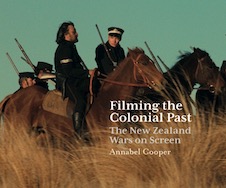The New Zealand Wars on Screen
Annabel Cooper
 The book
The book
The New Zealand Wars were defining events in the nation's history. Filming the Colonial Past, an engaging new book from Annabel Cooper, tells a story of filmmakers' fascination with these conflicts over the past 90 years. From silent screen to smartphone, and from Pākehā adventurers to young Māori songwriters, filmmakers have made and remade the stories of this most troubling past.
When Rudall Hayward went to Rotorua, Whakatāne and Te Awamutu to make his two versions of Rewi's Last Stand (1925, 1940) and The Te Kooti Trail (1927), he quickly found that the tangata whenua he relied on for making his films would help to shape the stories. By the time of the renewed interest in the New Zealand Wars in the 1970s and early 80s, thinking about race, nation and empire was undergoing a sea-change. The makers of television drama (including The Governor) and independent film (Geoff Murphy's Utu) set out actively to engage with Māori advisers and performers.
In the late 1980s and 90s, screen industry deregulation brought a new set of challenges. Filming the Colonial Past shows how documentaries – notably the New Zealand Wars series of 1998 – and feature films – Vincent Ward's River Queen and Rain of the Children – negotiated these hurdles. Meanwhile, Māori working on Pākehā-led productions honed their skills.
Today, the growth of Māori creative control, enabled by the diminishing cost of digital media and the expansion of platforms, signals a new era. From these sources come documentaries from Māori perspectives and new ways of exploring the past, from music videos to online histories.
Each of these productions is a snapshot of a complex cultural moment. In examining this history, Annabel Cooper illuminates a fascinating path of cultural change through successive generations of filmmakers.
The author
ANNABEL COOPER is Associate Professor, Department of Sociology, Gender and Social Work at the University of Otago. Her research covers a range of subjects in New Zealand cultural history. Her edition of Mary Lee's The Not So Poor and her contributions to Sites of Gender: Women, men and modernity in southern Dunedin explored gender, place and poverty in nineteenth-century New Zealand, and she has written further about place in articles on films, suburbs and settler masculinity.
Publication details
Paperback, 200 x 240 mm, 322 pp, photos throughout, ISBN 978-1-98-853108-3, $49.95
November 2018